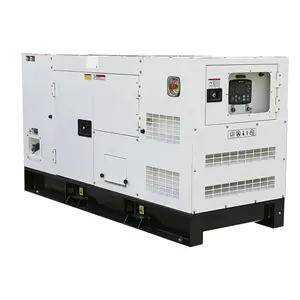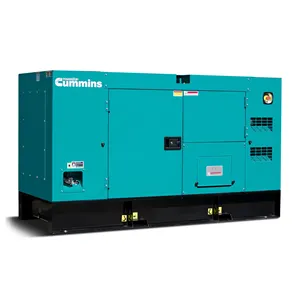(445979 products available)






































































































































































































































There is a wide range of china generators available in the market today. Each of these types has been developed to run on different fuels, and each serves different needs. Below are the most common types in the market.
These generators are permanently installed and automatically supply power to a home or business when the main power source goes off. They run on natural gas, LP, or diesel, depending on the model and market availability. These generators provide a steady output of power and are often used as backup units for critical systems.
These are smaller, more cutting-edge, and more versatile generators designed for use in several different situations. With portability as their primary characteristic, these devices are for power collection when needed. They primarily run on gasoline, LP, or diesel fuels. Portable generators are still small or mid-size, so they are easy to maneuver and can be employed for various functions, such as powering tools on a building site or providing temporary home backing.
These generators are revolutionary in terms their ability to produce clean, steady energy. They contain advanced inverter circuitry that allows them to adjust power output in changing loads. This makes them perfect for sensitive devices like TVs, tablets, and mobile phones. Inverter types are often lightweight and compact, making them ideal for travel and recreational use. While a little more expensive than other kinds, their fuel efficiency and quiet operation make them a very good investment for many end users.
Industrial-grade generators are large-sized generators that provide premium power solutions to factories, construction sites, and even mining operators. Such a generator is built with exceptional ruggedness and durability to withstand a critical and continuous working environment. These are usually highly configurable in terms of power output, fuel type, and size. This is done to make them suitable for large operations. The fuels that can power these generators include propane, diesel, natural gas, and gasoline.
Solar-powered generators convert and use energy from the sun through solar panels. They are renewable and always able to provide power without causing environmental degradation. A typical solar generator is made up of a solar panel, an inverter, and a battery storage unit. This makes it a very flexible unit that can charge during the daytime and provide power when needed, making it ideal for emergency use or off-grid living.
Any Generator basically features a number of parts. Each part plays an important role in the overall functioning and effectiveness of the generator used. Below is a breakdown of the main components found in most generators, including the China Generators.
The engine is the primary driving force that works in any generator set. Whether it is an inverter generator or standby or portable generator, the engine always plays an important role in generating electricity. The generator engine can use diesel, natural gas, LP, or gasoline as its fuel, depending on its generator type.
The alternator is a part that converts mechanical energy in the system into electrical energy. An alternator contains a rotating magnetic field that generates electricity on its rotor. And on its stator is the winding where the produced electricity is captured. So, the alternator's size and design will impact the generated current and voltage quality.
The fuel tank stores the gasoline, diesel, natural gas, or LP inside it, which is used in the generator to produce electricity. The environmental protection agency or the EPA requires the generation sets fueled by gasoline and diesel to have a well-built and sealed fuel tank. This is to minimize both fuel evaporation and spillage. The fuel tank's size will determine how long the generator can run before needing a fuel refill.
There are some generators that require a battery. Also, there are batteryless generators like the China inverter generator. These kinds of generators are known as recoil start generators. A battery is required to power these self-starter electric generators that start themselves at the push of a switch. The generator battery voltage must match the generator voltage. For instance, a 12V battery must be used for 12V generators.
The control panel is the part of any generator that manages and controls the generator system. It contains a few switches and gauges that let the end users monitor and control the systems that control the mechanisms and generate the electrical output of the generator set. There are also automatic control panels found in standby or automatic generators. These automatic control panels work automatically. These panels also have LCD screens that help monitor the generator status.
The outlet is a part of the China generator where the user plugs in appliances or equipment to get power. The available generator outlets and their power ratings will determine what can be powered by the generator.
Generators are widely used across many industries to ensure smooth performance. They are extremely critical, especially when there is power interruption or in places with no main electricity supply. Here are the most widespread scenarios where generators are used commercially:
Generators are the number one source of electrical power on any construction site. After all, construction often doesn't need to be done, and it happens at places where the electricity supply from the mainlines is being taken. They provide the much-needed power to run critical construction equipment such as drills, concrete mixers, welding machines, and lighting. Since construction work can also be done at night or in remote areas, there is always a need for reliable generators. These generators can be LP, diesel, or solar-powered, depending on efficiency and availability.
Healthcare institutions such as hospitals, clinics, and pharmaceutical companies have to provide power nonstop. They use backup generators to power critical medical devices, patient care, and surgical lighting during outages. Generators are also used to power backup batteries and internal communications to ensure emergency response capability is still intact. Hospitals also install standby or automatic generators, which automatically turn on when they sense an outage.
Large-scale outdoor events including concerts, festivals, and exhibitions always use generators to power stages, sound systems, lighting, and other equipment. Organizers don't want to rely on the local electricity supply. They prefer generators because they give them the freedom to host in almost any venue. Event managers use propane and gasoline generators for smaller space and diesel for larger spaces.
Today, most farming activities involve the use of machines. Therefore, generators are used to power irrigation systems, greenhouses, lighting, and other farming equipment. Remote and off-grid farms are completely dependent on generators for their continuous power. Farmers choose standby, diesel, and solar generators. The type is chosen based on availability, farming needs, and cost benefits.
Both police and fire stations use generators so they can always respond to any emergency no matter the power situation. These essential services always use both portable and standby generators to protect public safety and work on civil defense systems. Moreover, emergency medical services such as ambulances also have built-in generators for use in areas with no power supply.
The telecom industry has countless China generator sets. This is because power reliability is very crucial in telecommunication services. It has to ensure consistent network availability. It uses generators to power radio towers, data centers, and other telecom equipment during an outage. It also applies continuous vibration system analysis, trending, and reporting with generator sets.
A generator is a huge investment. There are several factors to consider to ensure the best operational efficiencies. Here are the key considerations to help select the most ideal one:
The kind of generator to go for will depend on its intended use. Standby and automatic generators are used for home and business backing. There are portable and inverter generators for moderate and off-grid powering needs. Industrial and commercial processes require heavy-duty generators that provide continuous power.
The rising cost of fuel makes efficiency a key consideration. The fuel type will determine its running efficiency. Diesel generators are the most fuel-efficient and, hence, the most cost-effective and beneficial for long hours of use. Natural gas generators provide lower fuel costs but give less energy output. Propane generators are more affordable but have a lower energy output than diesel generators.
This is another key consideration to remember when looking for a generator. It has to be size appropriate, so it must have enough watts or kilowatts to run desired appliances or equipment. Don't want to overload the generator, as this will affect its operational life. And don't want to underpower it either because it has to provide energy consistently, especially when needed the most. First, determine the power needs, which are the required watts or kilowatts, then choose the one that matches that requirement.
The level of operanig noise produced by a generator should also be considered. This is especially important if the generator will be used close to residential areas. Inverter generators are the quietest at running noise levels. Standby generators are next quieter. Diesel and natural gas generators are louder than the above two but cannot be housed in sound-attenuated enclosures.
Portability is another factor to consider, especially when the generator will have to be moved frequently. This is very useful in construction and outdoor events. The easily movable generator type is a portable generator. They are compact and lightweight and have built wheels for maneuvering.
Budget also plays a crucial role. Portable generators are the cheapest generator type, while industrial generators are the most expensive. Inverter generators, standby, and diesel generators fall between the two in terms of cost.
A1: The average operational life of a China generator will depend on the type and fuel used and the hours of use. Standby generators can last between 10,000 and 30,000 hours. A diesel generator can last between 20,000 and 40,000 hours. The operational life of portable generators can be between 1,500 and 3,000 hours.
A2: It is not advisable to leave a generator outside in the rain. It means storms, winds, and flooding season should be dreaded too, as they put the devices at risk. In the event of a storm that results in power outages, a home backing generator cannot be used if it rains without a cover or shelter. There are generator enclosures and shed shelters that protect generators from the natural elements while still allowing proper ventilation. These are the best ways to protect generators from the effects of rainfall.
A3: Some of the common signs that ascertains the need to replace a generator include: inconsistency in providing power, annoying operational noise, frequent fuel wastage, and physical damage or wear and tear.
A4: Although both a generator and a generator set perform the same function, they are not the same at all. A generator is an electrical machine that transforms mechanical energy into electrical energy. While a generator set is a set that includes a generator and a motor and other auxiliary equipment for producing electricity.
A5: The main difference between a solar generator and a generator is the power source. A generator utilizes fuels such as diesel, gasoline, natural gas, and propane. While a solar generator uses the sun's rays. Another difference is that generators provide unlimited energy as long as the fuel is available, while a solar generator can only provide energy for as long as the sun is shined on the solar panels, then stored in the battery and used later.